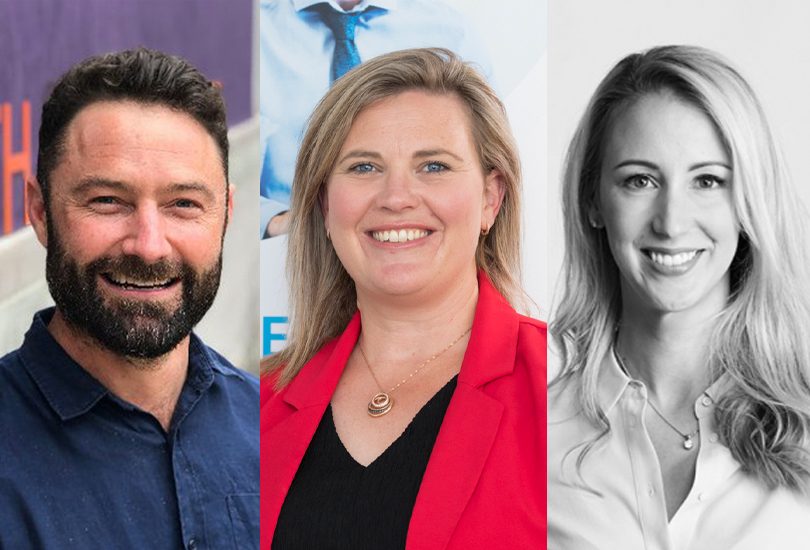
Youth Coalition of the ACT Executive Director Justin Barker, Conflict Resolution Service CEO Mel Haley and Lifeline Canberra CEO Carrie-Ann Leeson. Photos: Supplied.
Canberra’s social services are warning that the consequences of the COVID-19 crisis will be long-term, and that governments must factor in the need for ongoing funding if frontline organisations are to meet the need.
Organisations like the Conflict Resolution, Lifeline Canberra and Youth Coalition of the ACT (the peak body for multiple youth support services) are all reporting a spike in demand for their services.
They say there will be major problems later in the year as the effects of the shutdown and isolation accumulate. And the frontline services all say that the government will need to acknowledge the significant and likely long-running spike in demand when considering funding.
Conflict Resolution Service (CRS) CEO Mel Haley says CRS has had to move quickly to change the way they operate and the way they interact with their clients in response to COVID-19, while at the same time juggling demand.
“We are a people organisation. To physically move away from our clients at a time of need, and not be able to have contact, has had a huge impact. We have found that people need information, and for us to connect with them. I think the impact is actually going to be much bigger in six months when we go back to normal.”
Lifeline Canberra’s CEO Carrie Leeson says the service has already seen evidence that people are having difficulty in their lives after a summer of disasters.
“We were already dealing with a higher call volume so this has certainly complicated and exacerbated the situation for many people and the impact is growing,” she says.
It’s a trend closely mirrored in the youth sector, where existing problems have been multiplied by the pressures of social distancing.
Youth Coalition executive director Justin Barker points out that many of their existing clients are already separated from the family and support networks most of us rely on during times of crisis.
“The big issue for us is that there is more pressure on families and for those that don’t have normal supports around them. For homeless youth, unable to return home, many are now stuck in youth accommodation, without jobs and no income,” Mr Barker says.
CRS and Lifeline both believe they’ll be able to continue delivering services on existing funding levels for the time being but are warning of the long-term consequences of major social upheaval. Carrie Leeson says that while Lifeline is well-positioned to scale up their service, training is the biggest cost at $10,000 for each new volunteer.
There’s a degree of optimism internally about the chance to move services online and look at new delivery methods, but also a belief that if the community handles this crisis well, there are potentially positive outcomes.
“People often don’t realise that they already have the skills to cope. They can tap into those skills, and learn to live through this,” Ms Leeson says.
And Justin Barker agrees that the depth of the crisis could provide an opportunity to reflect on how to strengthen our ties.
“We are all learning how interconnected we are and that we need to be grateful for the connections we have. School, work, things we might normally complain about, we can now be grateful for, and realise how much we all rely on each other. I hope that everyone will appreciate their connectedness post-COVID-19.”
For more information visit:
Healing social conflict in hard times
Hard times create conflict at all levels as people struggle to manage the challenges of the COVID-19 crisis. Today, we speak with three frontline agencies about how they're helping the community to manage major problems.
Posted by The RiotACT on Wednesday, April 1, 2020













